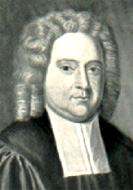
James Kirkpatrick (c.1676-1743), an Irish Presbyterian minister, played a leading role in the development of non-subscription and the creation of the Presbytery of Antrim as a liberal body separate from the Synod of Ulster. He was the first minister in Belfast to argue for the principles of non-subscription.
James was probably born in Scotland from whence his father, Hugh Kirkpatrick, a minister, came to Ireland to serve the congregation of Ballymoney, county Antrim. James matriculated at the University of Glasgow in 1691 and was a fellow student, for at least some of his time there, with John Abernethy. Following preparation for the ministry under the Presbytery of Route, he was ordained as minister of Templepatrick on 7 August 1699 and continued there for seven years.
In 1706 he accepted a call from the Belfast congregation as colleague to the Revd John McBride. The Belfast congregation, which had grown rapidly, numbered more than three thousand members. McBride was a non-abjurer; that is, he had refused to take the oath abjuring the claims to the throne of James II’s son. At the time of Kirkpatrick’s call McBride had fled to Scotland to avoid arrest. He had suggested that the original Belfast congregation should be divided and a second meeting house built. Eventually, after complicated negotiations, the Belfast church did just that. A new meeting house was built immediately behind the first as the home of Kirkpatrick’s Second congregation.
Kirkpatrick soon achieved prominence in the religious life of the town. In 1712 he was moderator of the Synod of Ulster. In the following year he published An historical essay upon the loyalty of Presbyterians, one of the first substantial publications to emerge from within Presbyterianism in the North of Ireland. His book was an answer to attacks on the Presbyterians by William Tisdall, vicar of Belfast.
In 1705 Kirkpatrick was a founding member of the Belfast Society, a gathering of ministers and lay people who met to discuss the Bible and new developments in theology and philosophy. He later wrote a valuable account of the activities of the Society. In common with Abernethy and others he adopted an increasingly critical attitude towards humanly formulated creeds, particularly the Westminster Confession of Faith. Following the publication in 1720 of Abernethy’s sermon Religious Obedience founded on Personal Persuasion, Kirkpatrick became one of the main supporters of the non-subscribing view in the ensuing pamphlet war. In 1721 he published A vindication of the Presbyterian ministers in the north of Ireland.
In Belfast the struggle between subscribers and non-subscribers became especially bitter. The controversy came to a head following the death of John McBride. In 1719 the First Congregation extended a call to Samuel Haliday, a former army chaplain, educated at Glasgow and Leiden universities, who had travelled extensively around Europe. Haliday, already accused of being an Arian—a charge he refuted—was vocal in his support for the non-subscribers. He refused at his installation in 1720 to subscribe the Westminster Confession. Four attending ministers protested continuance of the service, but under the direction of Kirkpatrick, acting as moderator, the installation went ahead.
Orthodox subscribing minorities in both the First and Second congregations subsequently left their churches to found a third congregation. Despite the protests of Kirkpatrick and Haliday, appeals to Scotland brought financial support for the new meeting house. Matters became yet more strained when the Third Congregation held its first communion service in February 1724. Kirkpatrick and Haliday were prevented from taking part. Kirkpatrick went into print with A scripture plea against a fatal rupture and breach of Christian communion, but he was unable to prevent the Synod of Ulster making subscription to the Westminster Confession compulsory for all ministers. In 1725 Kirkpatrick and other non-subscribers were placed in the Presbytery of Antrim, formally separated from the Synod in the following year.
Throughout his ministry Kirkpatrick also practised as a physician. He achieved the rare, if not unique, distinction of being awarded the degrees of MD and DD by Glasgow University in the same year. In his later years he published both medical treatises and theological works, the last of which was A defence of Christian liberty, brought out posthumously by the Belfast publisher James Blow. Kirkpatrick died on a visit to Dublin in 1743.
Sources
The Records of General Synod of Ulster, vols.1 & 2 (1890 & 1897) is an essential source for the life of James Kirkpatrick. The most useful short biography is by Alexander Gordon in ‘Congregational memoirs: Templepatrick’, The Disciple (1882). There are also biographical articles by Thomas Hamilton in the Dictionary of National Biography (1892) and David Steers in the New Dictionary of National Biography (2004). Also important are Munimenta Alme Universitatis Glasguensis (1854); J. S. Reid, History of the Presbyterian Church in Ireland, 3 vols (1867); T. Witherow, Historical and Literary Memorials (1623-1731) (1879); S. Shannon Millin, History of the Second Congregation of Protestant Dissenters in Belfast (1900); J. McConnell, ed., Fasti of the Irish Presbyterian Church 1613-1840 (1951); and Peter Brook, Ulster Presbyterianism: the historical perspective, 1610-1970 (1987).
Article by David Steers
Posted January 27, 2014